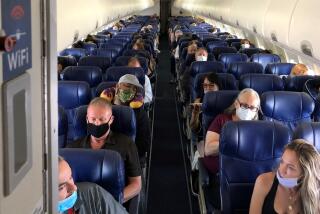ICC Will Ban Smoking on Most Interstate Bus Trips
- Share via
WASHINGTON — In another defeat for the tobacco industry, the Interstate Commerce Commission voted unanimously Tuesday to ban smoking on all regularly scheduled interstate bus trips.
The rule, which will take effect early next year after the ICC puts its decision into writing, applies to 300 bus companies which carry 94 million passengers a year. The nation’s 1,700 companies providing charter and tour service may continue to allow each group that contracts for services to decide whether smoking should be permitted.
The ruling came after the tobacco industry contended there are no proven health hazards for nonsmokers on interstate bus trips.
However, anti-smoking groups pointed to a Department of Transportation study showing the adverse effects on nonsmokers from breathing tobacco smoke in airplane cabins. Action on Smoking and Health (ASH), a nonprofit consumer group, noted that smoking still will be permitted at bus stations along the way.
“Smokers can refrain from smoking for several hours and light up at bus stops, but nonsmokers cannot similarly refrain from breathing,” John Banzhaf, the executive director of ASH, told the ICC.
The ICC began its rule-making process last March when two industry trade groups, the American Bus Assn. and the United Bus Owners of America, filed a joint petition asking the commission to ban smoking on interstate buses except those operated by charter companies.
A month later, ASH petitioned the ICC to extend such a prohibition to charter buses as well.
Citing evidence that smoking increases the threat of lung cancer and heart disease, both petitions noted that the U.S. surgeon general stressed in a 1986 report that the health threat extends to nonsmokers who breathe second-hand smoke in a closed environment.
Greyhound, the largest bus carrier, banned smoking on its own initiative last spring soon after the petitions were filed. Current ICC regulations provide that unless otherwise prohibited by state or local laws, bus operators may permit smoking in designated seats in the rear of a bus if they do not exceed 10% of the total capacity.
Last September, in inviting more public comment on its intention to impose a smoking ban, the ICC said: “We believe that this proposal will have a beneficial impact on the public health of bus patrons and bus drivers.” The commission said a variety of groups have since supported the ban.
ASH, the anti-smoking group, said in its petition that the more limited seating capacity of buses forces nonsmoking passengers to sit closer to smokers than in planes and trains, and that ventilation on buses often is inferior to that of airplanes. It added that poor and elderly travelers, who are more likely to suffer from pre-existing health problems, also make up a large percentage of interstate bus travelers since buses are generally cheaper than trains and planes.
Charter operators were exempted from the ban after expressing fear they would lose business if they were required to enforce a uniform nonsmoking ban.
More to Read
Sign up for Essential California
The most important California stories and recommendations in your inbox every morning.
You may occasionally receive promotional content from the Los Angeles Times.










